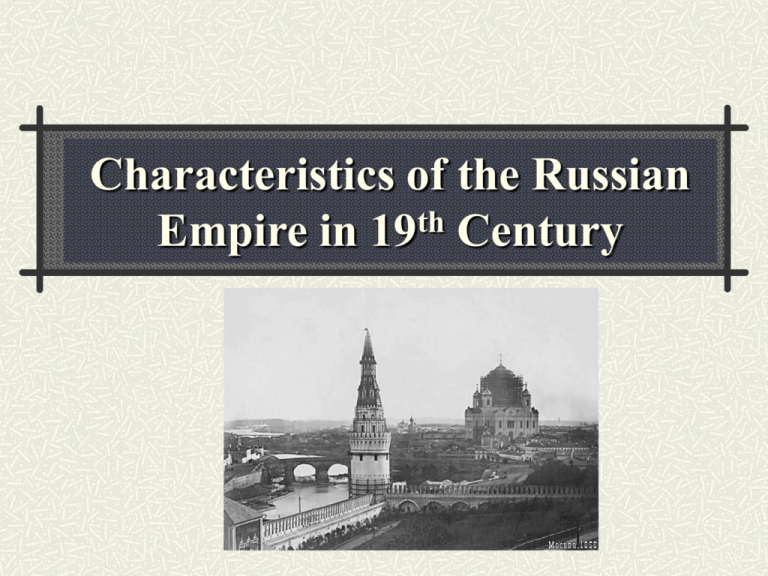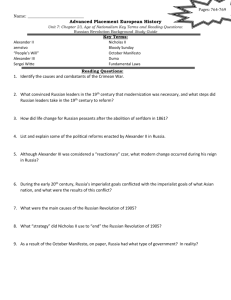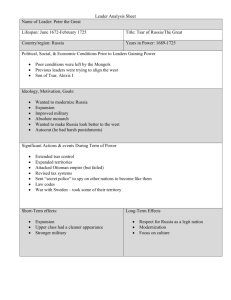
Characteristics of the Russian
Empire in 19th Century
Geography of
ew of Russia
Tsar Alexander I
December 23, 1777 – December 1, 1825
Alexander succeeded to the throne after
his father was murdered and ruled
Russia during the chaotic period of the
Napoleonic Wars.
While a reformist, he also won several
military campaigns. Under his rule,
Russia acquired Finland and part of
Poland.
The strange contradictions of his
character make Alexander one of the
most interesting Tsars.
Adding to this, his death was shrouded
in mystery, and location of his body
remains unknown.
Alexander II of Russia: The great
Reformer (1818-1881)
•Alexander II (1818-1881)
was emperor of Russia from
1855 to 1881.
•He is called the "czar
liberator" because he
emancipated the serfs in
1861.
•His reign is famous in
Russian history as the "era of
great reforms."
Great Reforms
Abolition of Serfdom 1861
Military Reform
Education Reform
Church Reform
Russia in the 1860’s
Great reforms:
Railway
Growth of industry
Commercial ties
with the Orient
Modern transportation: cholera
epidemic
Unfortunately the great strides in
modern transportation accelerated
the spread of cholera from India in
1816 to the ports of the Philippines,
China, Japan, Persian Gulf then
north toward the Ottoman and
Russian empires killing thousands
by 1826.
Alexander III (1881 – 1894)
Alexander was born on Feb. 26,
1845. His father was Alexander II
Alexander issued an imperial
manifesto on April 29, 1881,
which ended the constitutional
reforms of his father and
proclaimed the absolute power of
the emperor.
Political Cartoon
Alexander III (1881 – 1894)
The law empowered the government to
declare a state of emergency in any part
of the Russian realm; administrative
officials were given executive powers
such as:
Authority to make arrests
Imposition of fines
Confiscation of property without
trial
Transfer of cases from criminal court
jurisdiction to that of military
tribunals (more severe)
The closing of schools
The suspension of periodicals
Removal of local officials.
police-vs-protestor
Russia in the 19th Century
Russian literature of the nineteenth century
provided an agreeable medium for the discussion
of political and social issues. Direct presentations
of these discussions were censured.
The prose writers of this period shared important
qualities: attention to realistic, detailed
descriptions of everyday Russian life; the lifting
of the taboo on describing the vulgar, unsightly
side of life; and a satirical attitude toward
mediocrity and routine.
•Russia The Nineteenth Century
http://www.photius.com/countries/russia/society/russia_society_the_nineteenth_centu~1297.html
Sources: The Library of Congress Country Studies; CIA World Factbook
Russia in the 19th Century
The Age of Realism, generally considered the
culmination of the literary synthesis of earlier
generations, began around 1850.
The most significant prose writers of the Age of
Realism were Ivan Turgenev, Fedor Dostoevsky,
and Leo Tolstoy. Because of the enduring quality
of their combination of pure literature with
eternal philosophical questions, the last two are
accepted as Russia's premier prose artists
•Russia The Nineteenth Century
http://www.photius.com/countries/russia/society/russia_society_the_nineteenth_centu~1297.html
Sources: The Library of Congress Country Studies; CIA World Factbook
Revolutionary Thinking &
“ISMS”
Nihilism
Socialism
Utopian Socialism
Imperialism
Slavophilism
Anarchism
•
•
•
•
•
•
Marxism
Historical Materialism
Socialism
Leninism
Marxism-Leninism
Democratic Centralism
Russia in the 19th Century
Russia in the 19th Century
Russia in the 19th Century
Virgin and Child, Saint
Nicholas, Archangel Michael
Unidentified artist, Russian,
second half 19th century,
Russia in the 19th Century
19th Century Russian Icon
St Nicholas Center Collection
St. Nicholas ~ Wonderworker
In you proved yourself to be a priest,
a servant of divine things, O Saint,
for you fulfilled the Gospel of Christ, O holy one.
You gave up your life for your people
and saved the innocent from death.
You have been sanctified
for you were a great guide
towards the things of God.
—Kontakion of St. Nicholas
Russia in the 19th Century
The first medical faculty was established
in 1775 at the University of Moscow.
Main buildings of the university in the Mokhovaya Street, 1798.
Global
th
19
Century
London, England
Global
th
19
Century
Boott Cotton Mills, Lowell,
Mass., mid-19th century.
New York City
Skyscraper
American Civil War
Global
th
19
Century
The smokestacks of a 19th
Century French factory
Venice, Italy
Bibliography
•The Encyclopedia of World History, Sixth edition. Peter N. Stearns, general editor.
Copyright © 2001 by Houghton Mifflin Company. Maps by Mary Reilly, copyright ©
2001 by Houghton Mifflin Company. Published by Houghton Mifflin Company. All
rights reserved.
•History of Modern Russia Since 1855
History 4318 - Sul Ross State University - Rio Grande College, Uvalde, Texas Spring 2006
•Russia The Nineteenth Century
http://www.photius.com/countries/russia/society/russia_society_the_nineteenth_cent
u~1297.html
Sources: The Library of Congress Country Studies; CIA World Factbook









